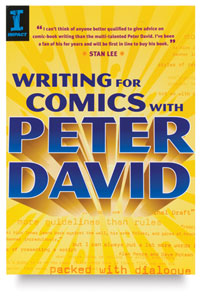“The Theme Is Your Spine”
 Yesterday I quoted a remark by comics novelist Alan Moore on how a powerful plot works. In the same essay that passage came from, Writing for Comics, Moore also insisted: "A plot isn't the main point of the story or the story's main reason for existing. It is something that is there more to enhance the central idea of the story and the characters who will be involved in it."
Yesterday I quoted a remark by comics novelist Alan Moore on how a powerful plot works. In the same essay that passage came from, Writing for Comics, Moore also insisted: "A plot isn't the main point of the story or the story's main reason for existing. It is something that is there more to enhance the central idea of the story and the characters who will be involved in it."
And earlier, "A good starting point would perhaps be the aspect that lies at the very heart of any creative process: the idea. The idea is what the story is about; not the plot of the story, or the unfolding of events within that story, but what the story is essentially about."
That reminder is echoed in another book called Writing for Comics, by Peter David--another scripter who's achieved a great deal of respect in adventure comics, if not the outright adulation that Moore can inspire. Using different terminology, David offered similar advice: Furthermore, you need to have a solid grasp of your theme. If ideas and conflict are the skeleton of your story, the theme is your spine. I define theme as that aspect of the human condition upon which your story offers commentary. Ideally everything that transpires in your story should somehow connect to your theme. It sounds simplistic, I know, but you must have a clear idea of your theme, and whence the conflict stems, before you embark upon telling your story. Without that, your story will be unfocused and vague.
While books about writing fiction in prose forms also discuss "the theme" or "the central idea," I rarely see such emphasis on that quality as a necessary early step in storytelling. Rather, many novelists argue that their themes develop as they write, and are in any event far more interesting to English teachers than to working writers. Novel-writing advice books often stress characters as the starting-point.
I think there are several reasons why these two writers put so much emphasis on theme in their advice to people wanting to enter the comics field.


No comments:
Post a Comment